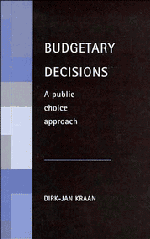Book contents
- Frontmatter
- Contents
- Foreword by Gordon Tullock
- Preface
- 1 Introduction
- 2 The structure of the budgetary process
- 3 Demand in the public sector
- 4 Supply in the public sector
- 5 Political decision-making
- 6 Bureaucratic decision-making
- 7 Institutions
- 8 Ways to reform
- Mathematical appendix
- List of symbols
- Glossary
- Notes
- References
- Index
8 - Ways to reform
Published online by Cambridge University Press: 20 January 2010
- Frontmatter
- Contents
- Foreword by Gordon Tullock
- Preface
- 1 Introduction
- 2 The structure of the budgetary process
- 3 Demand in the public sector
- 4 Supply in the public sector
- 5 Political decision-making
- 6 Bureaucratic decision-making
- 7 Institutions
- 8 Ways to reform
- Mathematical appendix
- List of symbols
- Glossary
- Notes
- References
- Index
Summary
The deficiencies of the budget mechanism
The integrated models of public demand and supply treated in chapters 6 and 7 make it possibly to identify a number of deficiencies of the budget mechanism. It should be kept in mind, however, that the models do not offer a complete explanation of the budgetary process in any specific government, but rather purport to explain elements of the process that are relevant to many different governments. Other partial aspects, that may be equally important in some specific government, are not treated.
An example of an element that has not been treated is the interaction between the representative assembly and the supreme executive authority. It was mentioned in chapter 2 that in the parliamentary and presidential systems of representative government both political authorities have to approve of budgetary decisions. The question arises as to what happens when both authorities have arrived at different (potential) decisions. In practice, this is a highly important element of the budgetary process that has to be studied on the basis of government-specific models because the competence rules that govern the relations between both political authorities vary strongly between governments. It was mentioned in chapter 2 that the executive authority has a much stronger position vis-à-vis the representative assembly in the parliamentary than in the presidential system. In the presidential system, much depends upon the expiration term of budgetary decisions. If this term is unlimited, the position of the President is much stronger than if annual authorizations are required.
- Type
- Chapter
- Information
- Budgetary DecisionsA Public Choice Approach, pp. 190 - 208Publisher: Cambridge University PressPrint publication year: 1996

